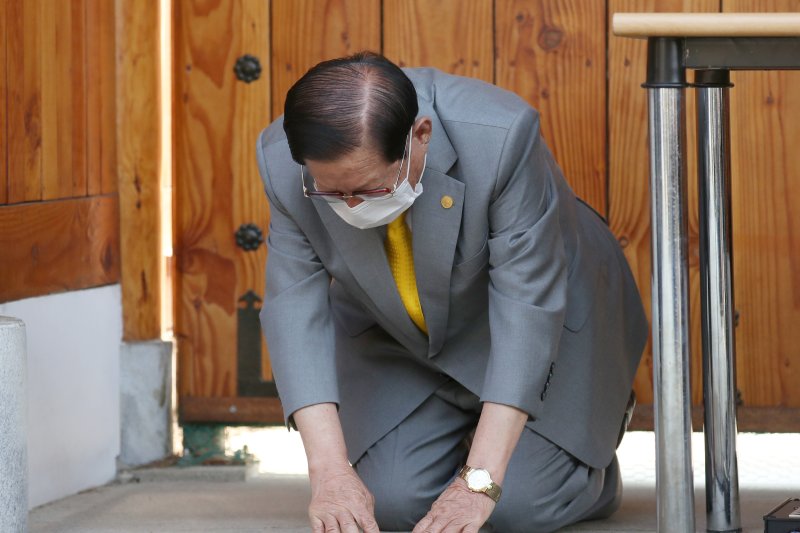
Lee Man-hee, founder and leader of the Shincheonji Church of Jesus, Temple of the Tabernacle of the Testimony, apologized for the role his organization has played in the COVID-19 epidemic in South Korea on Monday. File Photo by Yonhap/EPA-EFE
NEW YORK, March 5 (UPI) -- A mysterious religious organization in South Korea is in the hot seat following the massive outbreak of the new strain of coronavirus in the country, but placing members of the church under a harsh spotlight may be a counterproductive move, an analyst told UPI.
John Grisafi, a former U.S. Army intelligence analyst and a Ph.D. candidate in religious studies at Yale University, said the Shincheonji Church of Jesus, the Temple of the Tabernacle of the Testimony, may be being singled out in a way by local authorities that is counterproductive to efforts to contain COVID-19.
That does not mean Shincheonji should not bear responsibility for widespread infections that began with South Korea's Patient No. 31, who is believed to have attended services while sick, Grisafi said.
Slightly more than half of COVID-19 cases in South Korea can be traced back to the Daegu branch of the church, according to officials.
Actions taken by South Korean authorities, including what local media described as a "007-style" forced entry into Shincheonji headquarters, however, could be deterring church members from coming forward about possible infections.
"The group already feels marginalized," Grisafi said. "Suspicion of them and the feeling they are being persecuted could drive them further underground and have the reverse effect of what [the South Korean government] is trying to accomplish."
The church has reportedly hesitated to disclose a complete list of its members.
Shincheonji's secrecy, claims regarding the church's strict attendance requirements -- which may have contributed to the outbreak -- have roiled South Koreans who, according to a recent poll, are overwhelmingly in favor of a government-led raid of the church.
But the group, believed to retain 300,000 members worldwide -- with 200,000 in South Korea alone -- could also be attracting South Koreans in their 20s and 30s who may be struggling, according to local reports. Grisafi says diminished prospects for young people could be playing a role in the rise of groups like Shincheonji.
"Social anxieties, social stresses, economic stresses are a big part of why younger South Koreans, or young people in any country, are being motivated to join a group like that," he said.
"Maybe belonging to a closed special group makes them feel better, feels right to them."
China dilemma
The focus on Shincheonji has shifted the spotlight in South Korea.
China, the epicenter of the coronavirus outbreak, has largely faded into the background as COVID-19 has become framed as a "Shincheonji problem."
While more than 2,000 cases in Korea remain unrelated to the church, little attention is being paid to those cases as infections continue to rise in the country.
Last week President Moon Jae-in dismissed the idea of stricter quarantine measures against travelers from China, citing possible trade reprisals from Beijing. Chinese regions, meanwhile, have been actively quarantining South Koreans regardless of health status, according to local reports.
Kyle Ferrier, fellow and director of academic affairs at Korea Economic Institute in Washington, told UPI South Korea is heavily dependent on the global economy. Moon's approach to tackling the coronavirus has also yielded no discernible change in support for his administration ahead of general elections in April.
"Shutting off the borders, even temporarily, because of the coronavirus would disproportionately impact Korea," Ferrier said.
Matthew Shapiro, an associate professor of political science at the Illinois Institute of Technology, has studied trans-boundary pollution affecting both countries. Shapiro says past negotiations demonstrate the challenges of tackling environmental and public health problems affecting the region.
"There's been a lot of finger pointing from Korea to China," Shapiro said of pollution negotiations.
South Korea has said a significant portion -- about 30 percent -- of all fine dust originates from China, but the two sides have been unable to agree even on the science of air pollution.
"China doesn't acknowledge it at all," Shapiro said.
Shapiro also said South Korea learned from its experience with deploying U.S. missile defense system THAAD on the peninsula. China may have retaliated by either discouraging or preventing Chinese tourists from visiting Korea; tourism dropped by 70 percent at one point in 2017.
On the coronavirus, China has begun to indicate it is not interested in accepting responsibility for the global outbreak, which began in the Chinese city of Wuhan and had killed more than 3,200 people worldwide by Wednesday.
Last week, Chinese scientist Zhong Nanshan, dubbed the "SARS hero" by Chinese state media, said the virus might have not originated in China. His statement has since been followed by comments from the Chinese foreign ministry, which claimed there is no confirmation about the origins of the virus.
"Confirmed cases of #COVID19 were first found in China, but its origin is not necessarily in China. We are still tracing the origin," the ministry said on Twitter on Wednesday.
No comments:
Post a Comment